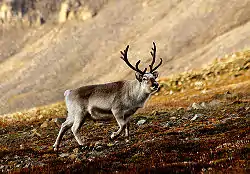馴鹿
See also: 驯鹿
Chinese
| attain gradually; tame | deer | ||
|---|---|---|---|
| trad. (馴鹿) | 馴 | 鹿 | |
| simp. (驯鹿) | 驯 | 鹿 | |
Pronunciation
Noun
馴鹿
- (obsolete) domesticated deer
- reindeer
Descendants
Sino-Xenic (馴鹿):
- → Japanese: 馴鹿 (junroku)
- → Korean: 순록(馴鹿) (sullok)
- → Vietnamese: tuần lộc (馴鹿)
Japanese

馴鹿 (tonakai, junroku): a reindeer.
Etymology 1
| Kanji in this term | |
|---|---|
| 馴 | 鹿 |
| Jinmeiyō | Grade: 4 |
| irregular | |
Borrowing from Ainu,[1][2][3][4] either トナッカイ (tonakkai, recorded as Sakhalin dialect),[4][5] or トゥナㇵカィ (tunahkay, listed in contemporary Ainu sources).[6] The kanji are an example of jukujikun (熟字訓), from Chinese 馴鹿.
Pronunciation
- (Irregular reading)
- (Tokyo) トナカイ [tònáꜜkàì] (Nakadaka – [2])[2][4]
- IPA(key): [to̞na̠ka̠i]
Noun
馴鹿 • (tonakai)
- a reindeer
Usage notes
As with many terms that name organisms, this term is often spelled in katakana, especially in biological contexts (where katakana is customary), as トナカイ. The kanji spelling is also less common in general use.
Synonyms
- カリブー (karibū)
Etymology 2
| Kanji in this term | |
|---|---|
| 馴 | 鹿 |
| じゅん Jinmeiyō | ろく Grade: 4 |
| on’yomi | |
From Middle Chinese 馴鹿 (MC ziuɪn luk̚, “tame, docile + deer”). Compare modern Cantonese readings seon4 luk6, seon4 luk6-2, Mandarin xùnlù, xúnlù, Korean 순록 (sullok), and Vietnamese tuần lộc.
Pronunciation
- On’yomi: Goon
- (Tokyo) じゅんろく [jùńrókú] (Heiban – [0])[2]
- IPA(key): [(d͡)ʑɨ̃ᵝnɾo̞kɯ̟ᵝ]
Noun
馴鹿 • (junroku)
- (rare) a reindeer
References
- 1988, 国語大辞典(新装版) (Kokugo Dai Jiten, Revised Edition) (in Japanese), Tōkyō: Shogakukan
- 2006, 大辞林 (Daijirin), Third Edition (in Japanese), Tōkyō: Sanseidō, →ISBN
- 1995, 大辞泉 (Daijisen) (in Japanese), Tōkyō: Shogakukan, →ISBN
- 1997, 新明解国語辞典 (Shin Meikai Kokugo Jiten), Fifth Edition (in Japanese), Tōkyō: Sanseidō, →ISBN
- Batchelor, John (1926) An Ainu-English-Japanese Dictionary, third edition, Tokyo: Kyobunkan
- 中級アイヌ語―美幌― (Chūkyū Ainu-go - Bihoro, “Intermediate Ainu: Bihoro”), Sapporo, Hokkaidō, Japan: 財団法人アイヌ文化振興・研究推進機構 (Zaidan Hōjin Ainu Bunka Shinkō / Kenkyū Suishin Kikō, “Foundation for the Advancement, Research, and Promotion of Ainu Culture”), 2011, archived from the original on 2016-03-05